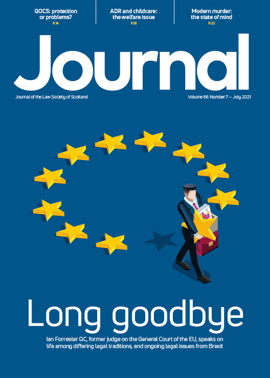In-house: Dealing at the cutting edge

Can you tell us about the purpose of your role and how it serves the interests of the university?
My role is within the contract team in the Research & Innovation Directorate (“R&I”). Research is vitally important for universities. Education is the other key element of the core university objective.
The principal mandate of this team is to support research and education contracts. In practice, I also provide legal and contract support to various academic-related and business functions of the university.
The agreements I deal with are all sorts of non-disclosure agreements and memoranda of understanding to Scottish, UK, EU and international collaborative research agreements, licence agreements, clinical trials, international educational franchising, and recently even contracts concerning a COVID-19 testing centre.
What does your day-to-day work involve?
The only constant is the review and drafting of agreements. My focus shifts depending on priorities.
I work in small teams, responsible for everything from small projects to projects of strategic importance. I work with business development officers, which is mainly around research grants; Internationalisation & Partnerships, regarding transnational education, international franchising joint institutes, UK partnerships, Go Abroad, and international agents; and the Commercialisation team, for whom intellectual property and data protection are significant areas of law.
Recently, many contracts have involved working with our external lawyers, both domestically and abroad, and with external commercial and tax advisers.
I am seconded for part of the week to provide legal advice and contracts, supporting the Procurement team and Finance, which is an excellent opportunity to participate in significant university activities, including developments in the university’s teaching and research facilities, such as MRI technology and, more recently, estates projects for teaching and staff offices.
I act as the R&I information champion as part of a cross-organisational group led by the data protection officer and Information Governance, part of the Directorate of Digital & Information Services.
The university has identified five interdisciplinary challenges. What are these, and how do the university’s strategic aims affect your work?
You’re on point with that question. The challenges are part of the university’s Aberdeen 2040 strategy, based on the 1495 foundational purpose of the University of Aberdeen, which is to be “open to all and dedicated to the pursuit of truth in the service of others”.
It directly impacts the organisation’s day-to-day work, crucially the attention of academic colleagues, and accordingly the contracts and legal advice. The challenges reflect the university’s twin goals, regional and global impact, and can be met by the university’s expertise in education and research.
The five interdisciplinary challenges are:
- Energy transition, where we are working on energy technology research contracts with the Centre for Energy Transition, National Decommissioning Centre in Newburgh, and the Net Zero Technology Centre, and with industry partners on green energy projects;
- Social inclusion and cultural diversity, which may relate to widening access articulation agreements with Scottish FE colleges and contracts supporting internationalisation in research, transnational education, student exchange and study abroad contracts;
- Environment and biodiversity, which could relate to collaborative EU or Official Development Assistance (“ODA”) agreements for multi-partner research projects about UN sustainable development goals, such as around climate action, life below water, and life on land;
- Data and artificial intelligence, which may refer, for example, to contracts establishing a joint institute with a data and AI focus with a major Chinese university and research contracts that develop into academic spin-outs for AI technology; and,
- Health, nutrition and wellbeing, which could relate to complex clinical trials contracts for the School of Medicine, Medical Sciences & Nutrition, collaboration with NHS Grampian or nutrition and research contracts for the Rowett Institute.
When you qualified as a solicitor, did you know in which area you wished to practise?
Not really. On qualification, I had vague ideas about working in-house.
I was fortunate to secure a commercial traineeship at a sizable Scottish firm, and remain hugely grateful for the opportunity to learn from leading professionals in multiple areas of the law that have all featured in my career since to a greater or lesser extent while working in-house.
At school and university, I had the romantic idea of being a lawyer working in practice and applying logic and analysis to complex legal problems. The dynamic and competitive reality was a completely different experience.
You completed an MBA at Strathclyde Business School last year – congratulations! How have this and your past employment helped you with your work at the university?
Thank you. I was thrilled to complete my MBA. It feels like a real accomplishment. I would recommend it to lawyers who want to develop their commercial skills, which I remember was an area of development for me as a trainee.
In the past, I have worked in public procurement, commercial contracts and major projects. Before that, I had stints working in governance and information law, committee reporting, statutory compliance, policy development, civil court, housing law, liquor and civic licensing, equality law and some child law.
Building towards and becoming a trusted lawyer means you are placed in situations and positions of greater responsibility where you represent your organisation externally, interacting with other professionals. The MBA helped me develop confidence in these interactions. It increases your understanding of the different professional disciplines and business areas that as a lawyer you work closely with, such as the C-suite, finance, HR, operations management and IT. I now feel more comfortable providing business-focused advice.
Regarding the direct impact on my work at the university, I was fortunate to interview several fantastic colleagues as part of my MBA project (thesis). The subject was university spin-outs (USOs). It extended my knowledge and understanding in that area, which has been helpful as I am aligned to support Research & Innovation’s Commercialisation team (aka the Technology Transfer Office). I am grateful for the guidance and support I received from colleagues.
Which skills and knowledge are essential when dealing with contracts on behalf of the university?
General commercial contracts experience, awareness of legislation that covers the public sector, e.g. Equality Act 2010, freedom of information, IP, data protection (UK GDPR), export controls, awareness of tax laws and insurance (Bribery Act 2010 and Criminal Finances Act 2017), public procurement. Understanding the higher education operating and funding environment is helpful, including incorporating the university, relevant higher education statutes, and the Scottish Code of Good Higher Education Governance.
What are the critical challenges for you and your contracts colleagues this year?
Brexit preparedness has been on our minds recently, and the ODA research funding cuts from UK Research & Innovation. Providing support across the organisation to a five-year plan will be a feature as we develop our campuses and estate. I will be supporting internationalisation as we further grow our global presence. And the changes around the Erasmus programme with the Turing scheme; supporting policy and governance developments internally; and providing support to our local plans in technology transfer, life sciences, energy transition and regional educational impact.
What have you done that has been innovative or resulted in process improvements?
I took part in the university’s initiative to secure electronic signatures using one of the leading software solutions. This was partly in response to COVID-19 and full-time working from home. I am part of the project implementation team, and the user group, and help colleagues to learn how to use the software.
Concerning policies, I’ve advocated for protecting our marks and brand in key international markets, and introducing an institutional export controls policy. I was involved in our response to the data protection impact of Brexit and worked with internal colleagues and external advisers on the treatment of tax, such as foreign exchange rules and the effect of the Criminal Finances Act 2017. I feed back on contracts and changing insurance requirements for our activities.
In terms of innovation, I work with the Commercialisation team – the bridge between the university and companies.
They support university spin-offs focused on research, startups, and collaboration with industry programs such as knowledge transfer partnerships. There’s some exciting stuff with life sciences and medical and engineering technologies.
What do you enjoy the most about working in the higher education sector?
Education and research are critically important to society, as we witnessed during the COVID-19 crisis.
You work with highly educated individuals and support the academic team, which often works on fascinating research in various disciplines. The opportunities are fantastic if you’re interested in culture and continuous learning and an international and culturally diverse work environment. There are conferences, festivals and events on different academic topics. The staff can use the tremendous Aberdeen Sports Village.
Professional development is encouraged, and I recently completed the ILM 3 Leadership & Management course. I’ve been attending a lunchtime French conversation group when possible, and take part in the Research Contracts Directors Group contracts subgroup.
What is your most unusual or fun work experience?
I attended an Erasmus staff exchange visit at the university research office in Aarhus, Denmark. It was informative and enjoyable. I was repeatedly questioned quizzically about Brexit by my continental counterparts, but remained diplomatic throughout.
You have been working at home during COVID-19. Is this the future, or will you return to the office when the Government eases the restrictions?
Working from home provided a welcome break from routine and commuting. Undoubtedly, it will be an enduring part of our professional life. However, I am now ready to go back to the office for at least a portion of the working week.
Our university HR department has developed a new working from home policy, which will help clarify the parameters. One of the considerations in preparing the policy was ensuring continued academic freedom regarding academics’ customary ability to work remotely ad hoc, which is essential to support teaching and research activity.
Another consideration was how to address the temptation to work longer hours when working from home. Many lawyers may be familiar with this!
Questions put by Hope Craig, In-house Lawyers’ Committee member
Perspectives
Features
Briefings
- Civil court: Final judgment
- Licensing: The shadow of criminal convictions
- Tax: Towards global rules for global businesses
- Immigration: Deporting the reformed character
- Coronavirus Acts: What does the new bill keep in force?
- Property: PSG at 20: still going strong
- In-house: Dealing at the cutting edge







